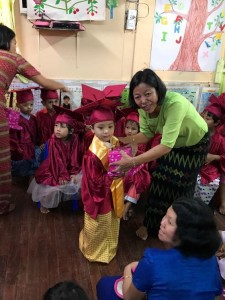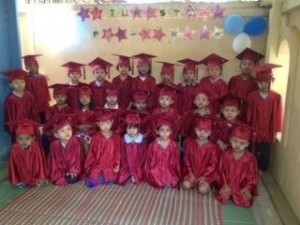Early Childhood Education
Early Childhood Education is the key focus of Children and Charity Myanmar.
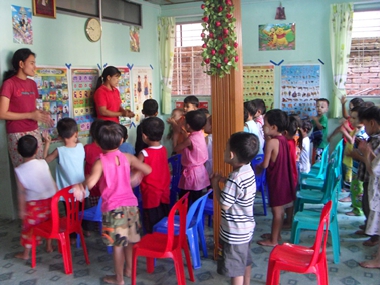
Why is early childhood education so important?
Currently it is estimated that just 23% of children in Myanmar have access to pre-school education. UNICEF reports that poverty is the main contributing factor, with more than half of all children in Myanmar (55%) living in poverty. Many families and children from impoverished communities struggle to access even the most basic services in health, education, water and sanitation and child protection. This significantly limits children’s futures by denying them opportunities to reach their full potential and deepens inequities in learning as they move into primary education.
Early childhood education is recognised as a core foundation for lifelong learning and development. Research demonstrates that it has a critical impact on the longer term educational, social and financial outcomes for the child and the society. Quality early childhood education is associated with age appropriate commencement of primary school, reduced school dropout rates, timely completion of education, language and literacy development, future employment and better future incomes.
For children from disadvantaged backgrounds these benefits are even greater, reducing the achievement gaps caused by poverty or other social factors. Early childhood education helps vulnerable children keep up with their peers, giving them more equitable opportunities educationally, and reducing long term inequity and systemic disadvantage.
Additionally, when a child attends an early childhood educational program their mother can potentially participate in the work force, thus increasing the family’s income. A World Bank study found that access to preschool for as little as two hours a day led to a 13.3 % increase in women’s workforce participation. Preschool attendance of the youngest child in the increases the likelihood of a mother’s full-time employment or an increase in her weekly hours of employment.
Sources of information:
- Myanmar Demographic and Health Survey 2015-16
- Plan International, Early Childhood care and Development: Myanmar, https://plan-international.org/myanmar/early-childhood-care-and-development-myanmar accessed 10/04/20) & (
- UNICEF (2018) Children in Myanmar, The situation of children in Myanmar: An Overview, https://www.unicef.org/myanmar/children-myanmar accessed 10/04/20
- United Nations Children’s Fund, (2019) A World Ready to Learn: Prioritizing quality early childhood education, UNICEF, New York, April 2019. https://www.unicef.org/media/57941/file/%20A-world-ready-to-learn-2019.pdf
- University of Hong Kong (2017) Myanmar East Asia- Pacific Early Child Development Scales (EAP-ECDS) Project, Nirmala Rao, Ben Richards, HKU Early Childhood Development and Education Research Team, The University of Hong Kong, June 2017, https://www.unicef.org/myanmar/media/3046/file/Early%20Child%20Development%20Scales%20Report.pdf.
- Global Partnership (2019), The Rational for Investing in Pre-Primary Education, https://www.globalpartnership.org/content/rationale-investing-pre-primary
- Global Partnership (2020), Early childhood education – a strong foundation for learning https://www.globalpartnership.org/sites/default/files/document/file/2019-08-21-gpe-factsheet-ecce.pdf
How does Children and Charity Myanmar address these concerns?
Children and Charity Myanmar operates one main pre-school in the Dawpon community of Yangon with 86 children enrolled. Two (2) preschools have been closed in recent times: one because of a lack of a reliable water supply and the other was closed in December 2019 due to reduced demand in the area. Future plans are for at least two new preschools in nearby poor communities as funding permits.
Children who attend the C&CM pre-schools come from poor families. The parents of most of the children cannot read and/or write. While public schools provide free education in Myanmar, preference is given to students who have basic literacy and numeracy skills.
The founders of Children and Charity Myanmar saw that many children from poor communities were unable to attend mainstream public schools or performed poorly due to a lack of preparation or financial barriers. They were inspired to establish pre-schools to provide an opportunity for these poor children to gain the skills required to enter primary school, and further their education.
Since 2006 more than 700 children have graduated from the C&CM preschools and have enrolled in Yangon public schools. Many of these children have been successful at winning academic awards. C&CM also provides some tutorial support and scholarships to support their ongoing learning (see Scholarship section for details of this program).
Mandatory Compliance
The C&CM preschools comply with the 2014 Myanmar Early Childhood Care and Development (ECCD) Policy. We employ early childhood educators/teachers who meet the government qualifications standards and fully meet all government registration requirements in terms of curriculum, equipment and facilities.
The preschools have adopted a Child Safety Policy and all teachers and staff receive ongoing training in Child Safety to ensure the safety and well-being of all children attending the Centre. As per government regulation CCTV has been installed in the preschool.
Learning Environment
The pre-school curriculum includes the basics of reading and writing both in English and Burmese, basic science and mathematics.
Children from poor families aged between 3 and 5 years are accepted for enrolment. The pre-school program commences in May each year and extends for one year. A formal graduation ceremony is held at the end of each school year and graduating students are presented with School Starter Pack (Scholarship program) to assist them as they transition to mainstream public school. Click here for more information on the scholarship program. In March 2020, another 46 students successfully graduated.
Cost
Parents pay a small fee, as they are able and provide their child’s daily lunch. C&CM subsidies the program to ensure that no child is excluded for financial reasons. All children are provided with two uniforms, raincoat and basic school supplies at no cost to the family. Emergency medical care is made available to children and their parents through our community programs on a case by case basis and on the availability of funds.
The capacity of C&CM to continue to subsidise fees for the pre-school is dependent on donations from overseas. The preschool operating costs can be met with as little as $50(AUD) per child per month.
Preschool Donations
Tax deductible Donations for the operational costs of the preschool can be made through our long term trusted partner Entrust (www.entrust.org.au) at http://www.entrust.org.au/projects/preschool-centres-for-vulnerable-children-yangon-myanmar-year-10/
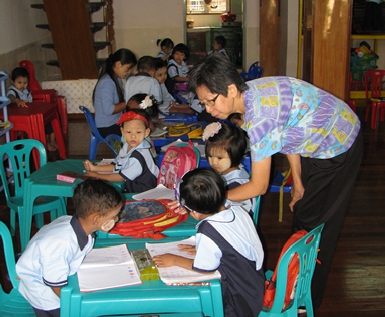
The student’s daily schedule commences at 8 a.m. and finishes at 3 p.m. There is provision for play, study, lunch, sleep and story time.
Play time is conducted indoors every morning from 8 a.m. to 9:30 a.m. The students rest from 12 noon to 2 p.m. Every Friday, students do handcrafts in the morning and there is video time in the afternoon.
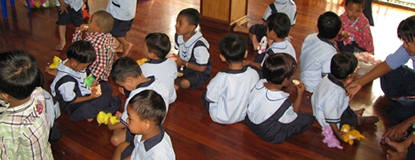
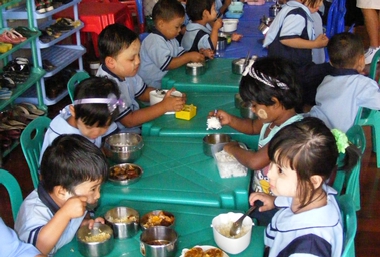
Fresh and home cooked food such as meat and vegetables or beans and vegetables are provided. Some parents cannot afford to pay for the cost of food or haven’t the time to pack lunch for their children.
Emergency medical care is available for the children and their parents.
A school uniform is provided and a change of clothing is available should it be required.
An assessment concerning a child’s progress at the pre-school is provided to the parents. It is given to the parents one month before graduation to invite comments.
The pre-school program commences in May each year and extends for one year. The children are expected to attend 90% of the time at school to qualify for graduation.
